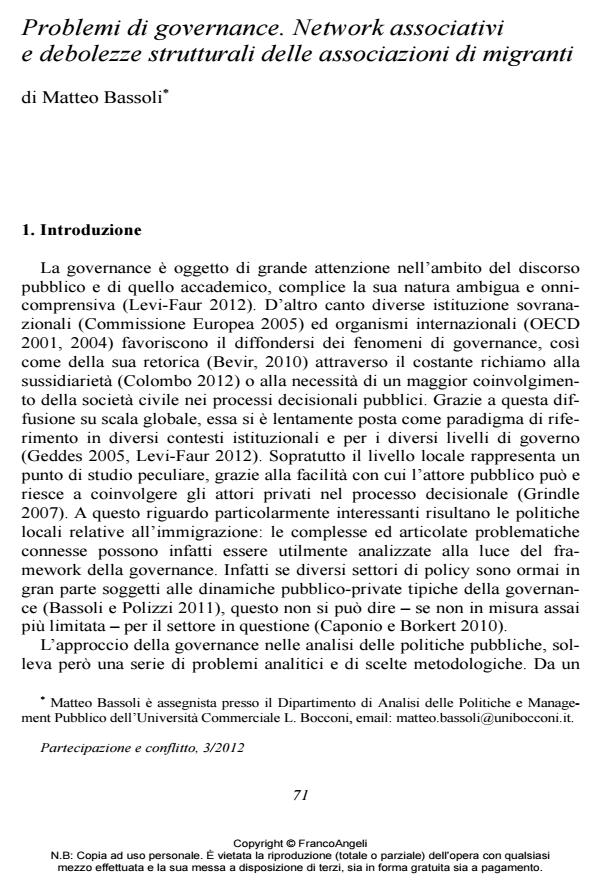Problemi di governance. Network associativi e debolezze strutturali delle associazioni di migranti
Titolo Rivista PARTECIPAZIONE E CONFLITTO
Autori/Curatori Matteo Bassoli
Anno di pubblicazione 2013 Fascicolo 2012/3
Lingua Italiano Numero pagine 30 P. 71-100 Dimensione file 606 KB
DOI 10.3280/PACO2012-003004
Il DOI è il codice a barre della proprietà intellettuale: per saperne di più
clicca qui
Qui sotto puoi vedere in anteprima la prima pagina di questo articolo.
Se questo articolo ti interessa, lo puoi acquistare (e scaricare in formato pdf) seguendo le facili indicazioni per acquistare il download credit. Acquista Download Credits per scaricare questo Articolo in formato PDF

FrancoAngeli è membro della Publishers International Linking Association, Inc (PILA), associazione indipendente e non profit per facilitare (attraverso i servizi tecnologici implementati da CrossRef.org) l’accesso degli studiosi ai contenuti digitali nelle pubblicazioni professionali e scientifiche.
The article assesses the role of civil society organisations in the governance framework. It looks at the migrant associations in Milan, their characteristics and their network to interpret the so-called crowding-out effect by autochthonous promigrant organisations in the provision of social services. The general hypothesis, building on the well-known governance literature, is that in the last decades public authorities while shifting towards more open decision making processes in other fields, did not follow the same approach for the migrant policies for specific reasons: both internal (such as political will) and external (migrant associations weaknesses). The article, using a network analysis approach, depicts the societal configuration created by the migrant associations in Milan to show that more factors are at game in the process of political isolation. Indeed, if the political support is completely absent, as typical of non-ethnicised societies, the civil society weakness has to be tracked back to three different aspects: the organisational fragilities, the geographic- based components of migrants associations and the multiple and confounding accesses that public authorities grants to migrant associations. The migrant civil society as a whole is thus isolated from public authorities unable to fully empower its constituency and to promote political activation in a context of small political opportunities structure. Nonetheless the most central actors within the migrant network are those able to actively cooperate with public institutions.
Parole chiave:Local Governance, Network Analysis, Local Migrant Associations
Matteo Bassoli, Problemi di governance. Network associativi e debolezze strutturali delle associazioni di migranti in "PARTECIPAZIONE E CONFLITTO" 3/2012, pp 71-100, DOI: 10.3280/PACO2012-003004